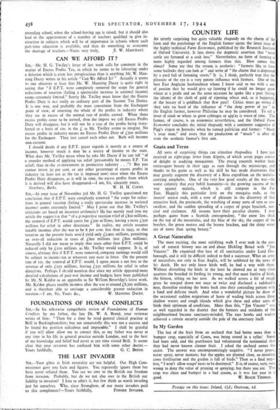CAN WE AFFORD IT ?
SIR,—Mr. H. G. Twilley's letter of last week calls for comment in the matter of Excess Profits Tax, in which he seems to be labouring under a delusion which is even less perspicacious than is anything Mr. W. Man- ning Dacey writes in his article " Can We Afford It? " Actually it seems to one observer at least that Mr. W. Manning Dacey is quite right in saying that " if E.P.T. were completely removed the scope for general reductions of taxation (failing a spectacular increase in national income) seems extremely limited." Surely Mr. Twilley must know that the Excess Profits Duty is net really an ordinary part of the Income Tax Duties. It is one way, and probably the most convenient from the Exchequer point of view, of annexing the whole of the profits in industry where they are in excess of the normal rate of profits earned. When those excess profits cease to be earned, then the impost we call Excess Profits Duty will disappear, but it will not be a case of the profits being trans- ferred to a basis of los. in the £ as Mr. Twilley seems to imagine. No excess profits in industry means no Excess Profits Duty of £5oo millions for the Exchequer. They just cancel each other out. Both will become non-existent.
I should doubt if any E.P.T. payer regards it merely as a source of income, however much it may be a source of income to the state. What does Mr. Twilley mean when he asks Mr. Dacey if he can tell " of a sounder method of applying tax relief (presumably he means E.P. Tax relief) than in•the re-investment in productive industry . . ."? But you cannot invest 3o per cent. or any other percentage of excess profits in industry (at least not as the tax is imposed now) since when the Excess Profits Duty disappears, as it will in time, the excess profits from which it is derived will also have disappeared.—I am, Sir, sincerely yours,


























 Previous page
Previous page